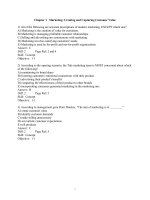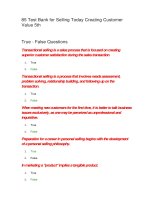Chapter 1 creating customer value and engagement
Bạn đang xem bản rút gọn của tài liệu. Xem và tải ngay bản đầy đủ của tài liệu tại đây (1.05 MB, 16 trang )
2/27/2021
Principles of Marketing
Seventeenth Edition
Chapter 1
Marketing:
Creating Customer Value and
Engagement
Copyright © 2018 Pearson Education Ltd. All Rights Reserved.
Learning Objectives
1-1 Define marketing and outline the steps in the marketing process.
1-2 Explain the importance of understanding the marketplace and
customers and identify the five core marketplace concepts.
1-3 Identify the key elements of a customer-driven marketing strategy and
discuss the marketing management orientations that guide marketing
strategy.
1-4 Discuss customer relationship management and identify strategies for
creating value for customers and capturing value from customers in
return.
1-5 Describe the major trends and forces that are changing the marketing
landscape in this age of relationships.
Copyright © 2018 Pearson Education Ltd. All Rights Reserved.
1
2/27/2021
Learning Objective 1
Define marketing and outline the steps in the
marketing process.
Copyright © 2018 Pearson Education Ltd. All Rights Reserved.
What is Marketing?
Marketing is a process by which companies create value
for customers and build strong customer relationships in
order to capture value from customers in return.
Copyright © 2018 Pearson Education Ltd. All Rights Reserved.
2
2/27/2021
Learning Objective 2
Explain the importance of understanding the
marketplace and customers and identify the five
core marketplace concepts.
Copyright © 2018 Pearson Education Ltd. All Rights Reserved.
Understanding the Marketplace and Customer Needs
• Needs are states of felt deprivation.
• Physical:
• Food, clothing, shelter, safety.
• Social:
ã Belonging, affection.
ã Individual:
ã Learning, knowledge, self-expression.
Copyright â 2018 Pearson Education Ltd. All Rights Reserved.
3
2/27/2021
Understanding the Marketplace and Customer Needs
• Wants are needs shaped by culture and individual personality.
Copyright © 2018 Pearson Education Ltd. All Rights Reserved.
Understanding the Marketplace and Customer Needs
Needs are states of felt
deprivation.
Wants are the form human
needs take as they are
shaped by culture and
individual personality.
Demands are human wants
that are backed by buying
power.
Copyright © 2018 Pearson Education Ltd. All Rights Reserved.
4
2/27/2021
Understanding the Marketplace and Customer Needs
Market offerings are some
combination of products,
services, information, or
experiences offered to a market
to satisfy a need or want.
Copyright © 2018 Pearson Education Ltd. All Rights Reserved.
Understanding the Marketplace and Customer Needs
• Products.
• Anything that can be offered for.
• Acquisition, attention, use or
consumption.
• That might satisfy a need or
want.
Copyright © 2018 Pearson Education Ltd. All Rights Reserved.
5
2/27/2021
Understanding the Marketplace and Customer Needs
• Services.
• Activities or benefits offered.
ã Essentially intangible.
ã Do not result in ownership of
anything.
Copyright â 2018 Pearson Education Ltd. All Rights Reserved.
Understanding the Marketplace and Customer Needs
• Experiences.
• Create, stage and market brand
experiences.
• Attending live theatre, music
concert.
Copyright © 2018 Pearson Education Ltd. All Rights Reserved.
6
2/27/2021
Understanding the Marketplace and Customer Needs
Market offerings are some
combination of products,
services, information, or
experiences offered to a market
to satisfy a need or want.
Marketing myopia is focusing
only on existing wants and
losing sight of underlying
consumer needs.
Copyright © 2018 Pearson Education Ltd. All Rights Reserved.
Understanding the Marketplace and Customer Needs
Exchange is the act of obtaining a desired object from
someone by offering something in return.
Marketing actions try to create, maintain, and grow
desirable exchange relationships.
Copyright © 2018 Pearson Education Ltd. All Rights Reserved.
7
2/27/2021
Understanding the Marketplace and Customer Needs
A market is set of actual and potential buyers.
Consumers market when they:
• search for products
• interact with companies to obtain information
ã make purchases
Copyright â 2018 Pearson Education Ltd. All Rights Reserved.
Learning Objective 3
Identify the key elements of a customer-driven marketing
strategy and discuss the marketing management orientations
that guide marketing strategy.
Copyright © 2018 Pearson Education Ltd. All Rights Reserved.
8
2/27/2021
Designing a Customer Value-Driven Marketing
Strategy
Marketing management is the art and science of choosing
target markets and building profitable relationships with them.
• What customers will we serve (target market)?
• How can we best serve these customers (value proposition)?
Copyright © 2018 Pearson Education Ltd. All Rights Reserved.
Designing a Customer Value-Driven Marketing
Strategy
A brand’s value proposition is the
set of benefits or values it promises
to deliver to customers to satisfy
their needs.
• Facebook helps you “connect and share
with the people in your life”
• YouTube “provides a place for people to
connect, inform, and inspire others across
the globe.”
Copyright © 2018 Pearson Education Ltd. All Rights Reserved.
9
2/27/2021
Designing a Customer Value-Driven Marketing
Strategy
Copyright © 2018 Pearson Education Ltd. All Rights Reserved.
Designing a Customer Value-Driven Marketing
Strategy
Production
concept
Product
concept
Selling
concept
Marketing
concept
Societal
Marketing
concept
Copyright © 2018 Pearson Education Ltd. All Rights Reserved.
10
2/27/2021
Production Concept
Consumers favor products that are
available and highly affordable.
⮚Improve production and distribution.
Product Concept
Consumers favor products that offer
the most quality, performance, and
innovative features.
Selling Concept
Consumers will buy products only if
the company promotes/ sells these
products.
Marketing Concept
Societal marketing
Focuses on needs/ wants of target
markets & delivering satisfaction
better than competitors.
Focuses on consumers’ wants,
the company’s requirements,
CHP: 1&5-21
consumers’ long-run
interests, and
society’s long-run interests.
Copyright © 2018 Pearson Education Ltd. All Rights Reserved.
Designing a Customer Value-Driven Marketing
Strategy
The marketing mix is comprised of a set of tools known a
the four Ps:
• Product
• Price
• Promotion
• Place
Integrated marketing program—a comprehensive plan that
communicates and delivers intended value
Copyright © 2018 Pearson Education Ltd. All Rights Reserved.
11
2/27/2021
Learning Objective 4
Discuss customer relationship management and identify
strategies for creating value for customers and capturing
value from customers in return.
Copyright © 2018 Pearson Education Ltd. All Rights Reserved.
Managing Customer Relationships and
Capturing Customer Value
Customer relationship management—the overall process of
building and maintaining profitable customer relationships by
delivering superior customer value and satisfaction.
Copyright © 2018 Pearson Education Ltd. All Rights Reserved.
12
2/27/2021
Managing Customer Relationships and
Capturing Customer Value
Relationship Building Blocks
•Customer- perceived value
The difference between total
customer perceived benefits
and customer cost
•Customer satisfaction
The extent to which perceived
performance matches a
buyer’s expectations
Copyright © 2018 Pearson Education Ltd. All Rights Reserved.
Managing Customer Relationships and
Capturing Customer Value
Customer lifetime value is the
value of the entire stream of
purchases that the customer would
make over a lifetime of
patronage.
Ex. At Stew Leonard’s profitable four-store
supermarket, the lifetime revenue of a
customer is $50,000. Because his average
customer spends about $100 a week,
shops 50 weeks a year, and remains in the
area for about 10 years
It’s five times cheaper to keep an old customer
than acquire a new one
Copyright © 2018 Pearson Education Ltd. All Rights Reserved.
13
2/27/2021
Managing Customer Relationships and
Capturing Customer Value
Share of customer is the portion of the customer’s purchasing
that a company gets in its product categories.
Ex: banks want to increase “share of wallet.”
Supermarkets and restaurants want to get more “share of
stomach.”
Car companies want to increase “share of garage,”
and airlines want greater “share of travel.”
Copyright © 2018 Pearson Education Ltd. All Rights Reserved.
Managing Customer Relationships and
Capturing Customer Value
Customer equity is the total
combined customer lifetime values
of all of the company’s current and
potential customers.
Whereas sales and market share
reflect the past, customer equity
suggests the future
Copyright © 2018 Pearson Education Ltd. All Rights Reserved.
14
2/27/2021
Managing Customer Relationships and
Capturing Customer Value
RIGHT
RELATIONSHIPS
WITH
RIGHT
CUSTOMERS
Copyright © 2018 Pearson Education Ltd. All Rights Reserved.
Learning Objective 5
Describe the major trends and forces that are changing
the marketing landscape in this age of relationships.
Copyright © 2018 Pearson Education Ltd. All Rights Reserved.
15
2/27/2021
The Changing Marketing Landscape
Digital and social media marketing
involves using digital marketing tools such
as web sites, social media, mobile ads
and apps, online videos, e-mail, and blogs
that engage consumers anywhere, at any
time, via their digital devices.
Copyright © 2018 Pearson Education Ltd. All Rights Reserved.
The Changing Marketing Landscape
• Not-for-profit marketing growth
• Rapid globalization
• Sustainable marketing
Copyright © 2018 Pearson Education Ltd. All Rights Reserved.
16









